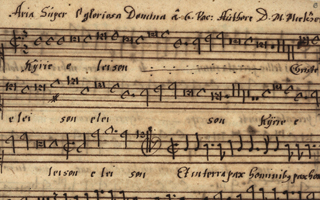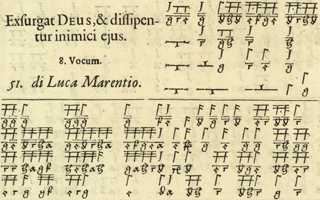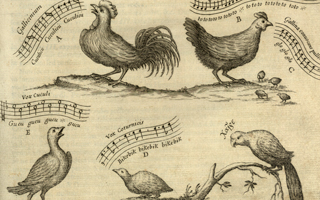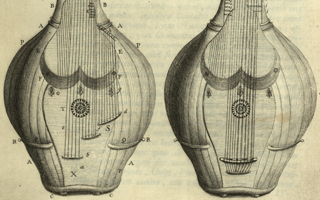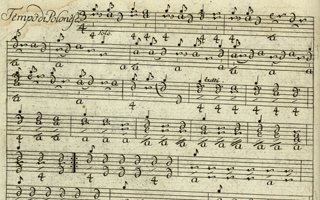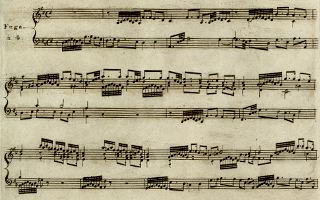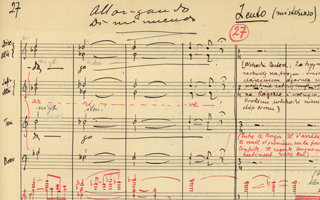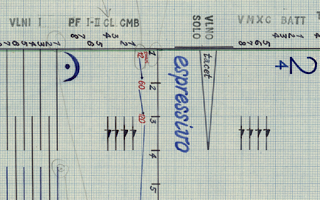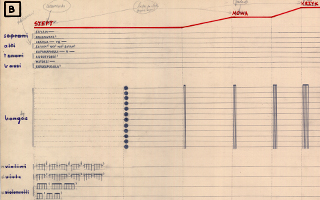Music Department
Opening hours:
- Monday 9 am – 7 pm
- Tuesday 9 am – 3 pm
- Wednesday – closed
- Thursday 9 am – 7 pm
- Friday 9 am – 3 pm
3rd floor, room 322
phone: + 48 22 55 25 740
+48 22 55 25 745
e-mail: muz.buw@uw.edu.pl
History and collections
The core of the Music Collection at the time of its opening consisted of objects from the collection of former Musicology Unit of Wrocław University (approximately 15,000 items). The majority of them had previously belonged to the collection of Musikalisches Institut at Wrocław University (the successor of the institution formerly known as Königliches Akademisches Institut für Kirchenmusik established in 1815, which collected the Lower Silesia church music left behind after the dissolution of monasteries or no longer used for the liturgical purposes). The afore-mentioned collections, which were transferred to the University of Warsaw Library in accordance with the act passed by the Ministry of Higher Education in 1952, included nearly 4,500 music manuscripts from the period between the 16th and 20th century, early printed music and numerous valuable books and scores, mostly of German origin. The most priceless items of the Wrocław collection are the mensural codex from the turn of the 15th and 16th century (“Kodeks wrocławski” (“Wrocław codex”) RM 5892 olim Mf 2016), the set of 18th century lute tablatures from the Cistercian abbey in Krzeszów and unique items, such as Missa super O gloriosa Domina by Marcin Mielczewski (17th century), manuscript copies of Bach, Händel and other composer’s works related to Wrocław Singakademie active in the first decades of the 19th century. The Collections of old manuscripts are subject to systematic development of an international database of RISM (Répertoire International des Sources Musicales). Nearly two-and-a-half thousand 19th and 20th century books and printed music items were transferred as a deposit to the University of Warsaw Unit (later Institute) of Musicology.
The collection of historic printed music housed in The University of Warsaw Library includes rare Polish musical items from the Library’s old collection which survived the war, including the collection of 16th century “Olkusz Partbooks” and an 18th century liturgical manuscript known as Graduał łowicki (Łowicz Graduale). Some historic objects belonging to the Library music collection are housed in other Library departments: Melodie na psałterz polski (Melodies for Polish Psalter) by Mikołaj Gomółka is kept in the Early Imprints Department, along with the small collection of early printed music (mostly liturgica), while the Print Room stores
a magnificent manuscript of J.-G. Noverre’s treatise entitled Théorie et pratique de la danse together with Médée et Jason ballet score and costume designs.
Currently the Music Department collects primarily printed music received as the legal deposit from Polish publishers. Its holdings reflect quite faithfully Polish music repertory published after 1945, in particular that produced by Polskie Wydawnictwo Muzyczne publishing house. The legal deposit acquisitions have been complemented through purchases of foreign publications; thus, the Department collections contain numerous titles belonging to the canon of music, including collective works of various composers, series of critical editions of printed music from various periods and places, etc. Around 1000 interesting position, not protected by copyright, (this number is growing) mostly Polish music of the 19th century, is published in the eBUW and IMSLP (International Music Score Library Project, also known as the Petrucci Music Library).
Visitors to the Department reading room are provided with reference works in the field of music (including the basics of musicology resources: encyclopaedias, lexicons, guides, catalogues, bibliographies, monographs on composers, etc) as well as a computer workstation, a listening booth and Yamaha-Clavinova synthesizer.
Archives of Polish Composers
The University of Warsaw Library Archives of Polish Composers, formerly known as the Archives of 20th Century Polish Composers, is the only collection in Poland orientated towards the comprehensive documentation of Polish contemporary music sources. The Archives were established in 1958 as a separate collection of the University of Warsaw Library Music Division. At present the collection includes more than 40,000 items: approx. 5,000 music manuscripts, nearly 30,000 letters written and received by Polish composers, several thousand photographs, posters, concert programmes and biographical materials (personal papers, family papers, literary and commentary writings and objects of historic value).
In the 1950s and 1960s the collection was enriched with the personal papers of Artur Malawski, Jan A. Maklakiewicz, Kazimierz Jurdziński, Roman Padlewski, Ludomir M. Rogowski, Karol Szymanowski and Stanisław Wiechowicz. In the 1970s the Department received the papers of Ludomir Różycki, Grzegorz Fitelberg, Zdenek Rund, Paweł Klecki and Witold Maliszewski. In the 1980s the Archives were enhanced with the works of emigrant composers: Tadeusz Z. Kassern, Michał Kondracki, Feliks R. Łabuński and Roman Palester. In the early 1990s the Library received a comprehensive collection of works from Adam Świerzyński. After 2000 the Archives incorporated the papers of Tadeusz Baird, Andrzej Dobrowolski, Włodzimierz Kotoński, Zbigniew Krukowski, Stanisław Janty-Połczyński, Tadeusz Machl, Mieczysław Mierzejewski, Karol Prosnak, Stanisław Prószyński, Witold Rudziński, Marian Sawa and selected personal papers of Edward Bogusławski, Tomasz Gablenz, Jan A. Maklakiewicz, Andrzej Panufnik, Kazimierz Serocki, Antoni Szałowski, Romuald Twardowski and Kazimierz Wiłkomirski. Besides this impressive collection of papers the Archives boast single music manuscripts by many famous composers, such as Grażyna Bacewicz, Witold Lutosławski, Krzysztof Penderecki, Henryk Mikołaj Górecki and materials documenting the professional activity of Polish musicologists, such as Krzysztof Biegański, Józef M. Chomiński, Stanisław Golachowski, Tadeusz Kaczyński and Zofia Lissa; the Archive contains also a collection of valuable documents related to the activity of pianist Andrzej Czajkowski.
The core of the collection consists of compositions and literary works by Karol Szymanowski – the greatest Polish composer of the first half of the 20th century. The collection was compiled primarily in the period between 1939 and 1946 by Łódź musicologist Stanisław Golachowski, who gathered the composer’s autographs, papers and personal belongings scattered among his relatives and friends. The University of Warsaw Library received this impressive collection of szymanowskiana in 1961 and commemorated the acquisition with a notation of Szymanowski’s Etude in B flat minor inscribed in one of the panels decorating the facade of the Library’s new building.
Equally valuable are papers of Roman Palester and Tadeusz Baird and the materials documenting the history of the Association of Young Polish Musicians in Paris (1936–1950) – a large collection of correspondence presenting various aspects of the Association’s activities.
Mostly based on BUW collections are created thematic online portals dedicated to selected composers: Szymanowski, Baird, Serocki.
The Archives boast important publications such as catalogues Rękopisy utworów muzycznych Karola Szymanowskiego (“Karol Szymanowski’s music manuscripts”), 1983 and Rękopisy kompozytorów Młodej Polski (“Manuscripts of Polish composers of Young Poland Group”), 1997 edited by Elżbieta Jasińska-Jędrosz and a guide Karol Szymanowski w zbiorach polskich (“Karol Szymanowski’s works in Polish collections”), 1990 edited by Wanda Bogdany-Popielowa. The publications were written in cooperation with the National Library of Poland. Work on the printed catalog of the Polish Composers’ Archives. A more recent project is The Catalogue of the Polish Composers’ Archives, which is intended to include the full documentation of music manuscripts in the collection was also started. Volume I has been published so far: Rękopisy muzyczne w zbiorach Archiwum Kompozytorów Polskich Biblioteki Uniwersyteckiej w Warszawie. Katalog, t. 1: A–Ł („Manuscripts in the collections of the Polish Composers’ Library of the University Library in Warsaw. Catalog, Vol. 1: A–L”) edited by Elżbieta Jasińska-Jędrosz. Numerous exhibitions on the individual composers as well as the whole collection have been organized such as the anniversary exhibition “The collections of the Archives of 20th Century Polish Composers” in 1998. When dealing with exhibitions and acquisitions, the Archives cooperate with the leading music institutions in Poland: Polskie Wydawnictwo Muzyczne, Polskie Radio (the Polish Radio) and Związek Kompozytorów Polskich (the Polish Composers’ Union). Various projects are implemented under the patronage of the Ministry of Culture such as the extremely important task of documenting and preserving collections of music objects run in cooperation with the Polish Composers’ Union, which resulted in the augmentation of the Archives’ collection with a large number of various music manuscripts. The objects included in the Archives serve as valuable resources for research, the making of documentary movies and publication of critical editions.
Items included in the Archives may be accessed by scholars and composers and – in well justified cases – also by students. Rare, microfilmed, non-catalogued and restricted items are not available. The collections may be accessed in the reading room of the Department on a previous request. Objects may be copied on the approval of the Manager of the Department only.
Catalogues
The catalogues of the collections of the Music Department are available in the Department reading room and include:
- the alphabetical card catalogues of printed and manuscript music,
- the catalogue of microfilmed music items,
- the catalogue of reference works,
- the catalogue of objects from the Archives of Polish Composers.
The scanned card catalogue of objects from the “Wrocław collection” is available online (follow the link to the Department web page or the Library catalogues from the Library website). Some recently acquired printed music items are recorded in the Library OPAC.
Practical information
- The Library user may enter the reading room of the Department with the pass issued by the Information Desk staff. In order to receive the pass the user is requested to show valid Library Card and ID card.
- Printed and manuscript music may be viewed in the reading room of the Department, while the access to early printed music and items from the Polish Composers’ Archives is limited and must be arranged in advance on the approval of the Manager of the Department. Students and non-academic users who wish to view the Department collections are requested to present references from their supervisors or parent institutions.The most valuable objects are available on microfilms in the Main Reading Room. Books and periodicals on music (excluding the Department reference works) which had been included in the Department holdings until 2000 (when the Library was moved to a new location) were incorporated into the Library’s main collection housed in the main storage area and open stacks. Presently they are available to all Library users.
- Copies of objects from the Department collections may only be obtained and further reproduced on the approval of the Head of the Department who also defines the method for the production of requested copies. Photocopies may be made of microfilmed objects only. Users may request paid copies from the Library Reprographic Office. In some extraordinary and well-justified cases the Manager of the Department may allow the user to take a photo of the original object.
The details on the availability of the Department collections are provided in The rules for accesing BUW special collections effective from 1st October 2012.






